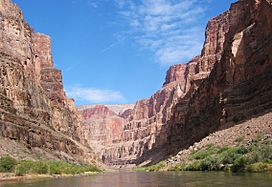Marble Canyon facts for kids
Quick facts for kids Marble Canyon |
|
|---|---|

A section of Marble Canyon from river level
|
|
| Geography |
Marble Canyon is a beautiful part of the Colorado River in northern Arizona. It stretches from a place called Lees Ferry to where the Little Colorado River joins the main river. This meeting point is also where the famous Grand Canyon officially begins.
Many people who want to explore the Colorado River start their journey at Lees Ferry. From there, they can go rafting through Marble Canyon and then continue into the Grand Canyon. Marble Canyon is also well-known for the Navajo Bridge, a big bridge where Highway 89A crosses the Colorado River.
This canyon forms the western edge of the Navajo Nation, which is a large Native American territory. In 1975, a special area called Marble Canyon National Monument became part of the larger Grand Canyon National Park.
Contents
What's in a Name?
You might think Marble Canyon is full of marble, but it's not! The name is a bit misleading. John Wesley Powell, a famous explorer, named the canyon. He knew there wasn't any real marble there. However, he thought the smooth, shiny limestone rocks looked a lot like polished marble.
He described it by saying, "The limestone of the canyon is often polished, and makes a beautiful marble. Sometimes the rocks are of many colors - white, gray, pink, and purple, with saffron tints." So, the canyon got its name because of how pretty its rocks looked.
A Dam That Was Never Built
For a while, there were plans to build a huge dam in Marble Canyon. This project was called the Marble Canyon Dam. The United States Bureau of Reclamation first looked into building it in the 1950s.
Later, from 1965 to 1968, the state of Arizona considered the idea again. But many groups, especially the Sierra Club, strongly opposed the dam. They were worried about how it would affect the environment and the natural beauty of the canyon. Because of this strong opposition, the plan to build the dam was finally stopped in 1968.
You can still see some signs of the old project today. If you look closely at Mile 39.2 in the canyon, you might spot some holes drilled into the Redwall Limestone walls. These holes were made during the early stages of the dam project.
Canyon Geology
The walls of Marble Canyon are made up of different layers of rock. The very top layers are called Kaibab Limestone. Below that, you'll find the Toroweap Formation. And even further down, there's a layer known as Coconino Sandstone. These layers tell a long story about how the Earth has changed over millions of years.
Canyon Ecology
Marble Canyon is a special place for plants and animals. It is the only natural home for a rare and endangered type of cactus called Pediocactus bradyi. This means it's very important to protect the canyon's environment to help this unique plant survive.
See also
 In Spanish: Cañón de Mármol para niños
In Spanish: Cañón de Mármol para niños
Images for kids
-
John Wesley Powell's second expedition taking a break in Marble Canyon.
-
A wide view of Marble Canyon from Navajo Bridge.
 | James Van Der Zee |
 | Alma Thomas |
 | Ellis Wilson |
 | Margaret Taylor-Burroughs |



